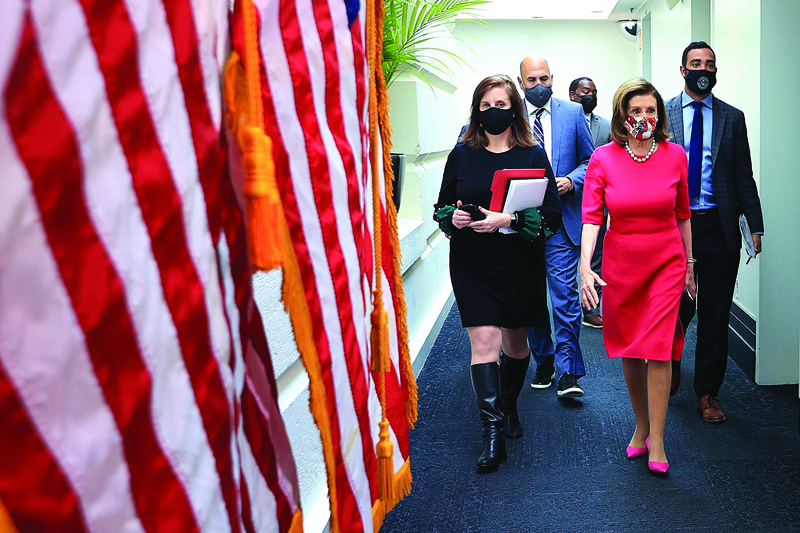 WASHINGTON: Speaker of the House Nancy Pelosi (D-CA) leaves the House Democratic caucus meeting at the US Capitol in Washington, DC. - AFP
WASHINGTON: Speaker of the House Nancy Pelosi (D-CA) leaves the House Democratic caucus meeting at the US Capitol in Washington, DC. - AFPWASHINGTON: Eight months after Joe Biden swept to victory on a pledge to make America more livable, equitable and environmentally-friendly, a Democratic civil war is threatening to shred his domestic agenda. Internal squabbles are nothing new in Washington but twin proposals to spend up to $5 trillion rebuilding the post-COVID economy have laid bare the extent of the eyewatering divisions confounding the party in Congress.
So profound are the disagreements between the party's left and centrist factions that they could easily leave Biden with no legacy to speak of and torpedo Democrats' chances in next year's midterm elections. By Friday morning, it is possible that Biden's bipartisan $1.2 trillion infrastructure bill will have failed, imperiling a larger, $3.5 trillion "Build Back Better" package of investments in child care, education, family leave and climate mitigation.
Moderates want the House to wave through the Senate-passed infrastructure bill without delay, giving Biden an easy win while negotiations play out on the larger package. But as many as 50 House progressives are expected to tank the bipartisan bill if they have no clear commitment on the larger-ticket legislation, known as the Build Back Better Act. They argue that they've already compromised on the price-which started at $6 trillion-as well as demonstrating unity on a $1.9 trillion COVID relief package that passed earlier this year.
Pelosi is always quick to frame vehement internal disagreement as "family discussion" that ultimately fosters togetherness. But progressives have been emboldened since the election to state in increasingly stark terms their frustration over centrists they see as beholden to special interests and too keen to subjugate Democratic values to bipartisanship. Alexandria Ocasio-Cortez, the most-high profile emissary of progressives in Washington, has urged centrist colleagues to view them as allies, not the enemy.
'Divide, divide, divide'
But try telling that to Joe Manchin, the West Virginia centrist Ocasio-Cortez recently lambasted over his record on climate change after he refused to support the $3.5 trillion spending bill. Ocasio-Cortez said Manchin had allowed oil industry lobbyists to dictate his climate positions and accused him of "'bipartisan' corruption that masquerades as clear-eyed moderation." Manchin in turn castigated the congresswoman for "just awful" rhetoric that he said had only one purpose-"divide, divide, divide." When top Senate Democrat Elizabeth Warren came out against Jerome Powell's reappointment as chair of the US Federal Reserve on Tuesday she pulled no punches, calling him a "dangerous man to head up the Fed."
And the internecine mudslinging shows no sign of cooling. Ilhan Omar, another progressive, suggested Monday in an interview that is sure to ruffle feathers that Manchin and other centrists balking at the high price of Build Back Better, were in the wrong party. "It is saddening to see them use Republican talking points, we obviously didn't envision having Republicans as part of our party," she told CNN. If Democratic infighting sometimes feels like one of life's inevitabilities, it is because the party's ethos places as much value on diversity as unity.
'Not a cult'
Democrats take pride in being a big tent reflecting a disparate nation of 320 million people with contradictory interests and competing ideological stripes. The Biden coalition last November included younger urban residents who distrust the police and demand racial justice, religious older Black voters, universal health care campaigners and defenders of transgender rights.
There were also white college-educated women who see socialism as a genuine threat but found Donald Trump repulsive, Latinos fighting for immigration reform and fierce proponents of women's reproductive rights. As a result, Democrats have won the popular vote by comfortable margins in every election but one in the last 30 years and their 50 senators represent millions more constituents than the 50 Republicans. But the party also has a harder time satisfying each of its constituencies. With perhaps the exception of health care, the leadership has struggled to project a unified message.
Biden was able to keep his coalition together by making the election about Trump and making a broad appeal to the "soul of the nation" rather than getting into the policy weeds. But fissures soon emerged as the conversation moved to the minutiae of fixing roads and bridges. House Democratic chairman Hakeem Jeffries tried Tuesday to characterize Democratic disagreement as preferable to Republican unity around the twice-impeached Trump. "The reality is, and we embrace that fact, we don't bend the knee to one out-of-control former president who continues to lie about COVID and the election," he said. "We're not a cult-we are a coalition." - AFP








